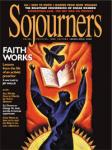Cheatin’ songs. That’s real poor man music. Rich guys don’t even understand somebody like Hank Williams. A rich man hardly needs a woman at all. If she runs away, who cares? He’ll go get another one. But when you’ve got nothing and not much to look forward to, then if your woman runs off and you lose the one good thing in your life, man, that just about kills you....We oughta get out of gospel and into cheatin’ songs....
—Fictional gospel singer Wendell Shepherd in Garrison Keillor’s WLT: A Radio Romance
That country music can teach us about Christian ethics may seem an odd claim. After all, country is the music of ignorance and racial bigotry, isn’t it? If I listen to country music, someone might think I’m a redneck! Yet, as Garrison Keillor’s fictional character notes, country is a music of the poor. The first lesson we can learn, then, regards stereotypes. Working-class whites (especially Southerners) are one group that can still be fashionably insulted in an era of political correctness. As the self-expression of a marginal group with whom academic ethicists and progressive Christian activists generally have little contact, country music offers a valuable perspective.
Country music is, of course, a commercial product. During most of the 1990s, country music held the largest market share of all radio formats, and its audience became the most educated and highest paid of all radio audiences. But country music traces its roots to the dirt poor rural populations of Appalachia, the cotton belt, and the dust bowl, and emerged as a commercial genre during the urban migrations of rural Americans following the Great Depression. Working folks struggling to survive amid intractable economic conditions—these are Hank Williams’ people. Elements of country’s core values survive despite country’s repeated drifts in and out of the cultural mainstream. So what can country music teach us about Christian ethics? What did I learn from Hank Williams?
HANK WILLIAMS’ MESSAGE can be encapsulated in propositions expressed in three of Hank’s song titles. First, "Wealth Won’t Save Your Soul." Money is no measure of a person’s value. The underlying affirmation of the equal dignity of all persons regardless of social class forms the basis of a tradition of social criticism from the perspective of the white working class. Randy Travis rejects the pretensions of upward mobility in favor of "A Better Class of Losers." Alan Jackson bemoans the effects of the global economy on small-town community in "The Little Man." Even Garth Brooks recognizes that one needs "Friends in Low Places."
Second, "I’ll Never Get Out of This World Alive." Life is disconcertingly difficult and unfair. The affirmation of basic human dignity stands in tension with the lived experience of marginalization. The fate that dooms romantic relationships in Hank Williams’ songs reflects a general sense that the powers determining life’s direction are capricious and beyond control. Travis Tritt, in "Lord Have Mercy on the Working Man," asks "why the rich man does the dancing while the poor man pays the band." Mark Chesnutt complains, "Every time I make my mark, somebody paints the wall."
Third, "Your Cheatin’ Heart Will Tell On You." Actions have consequences. Despite the fact that humans are "born to trouble as the sparks fly upward" (Job 5:7), we are responsible for our choices. Responding to life’s troubles by seeking escape in booze and sex only brings more trouble. One ends up, like George Jones, "still doing time in a honky-tonk prison."
What we don’t learn directly but can infer from Hank Williams and country music tradition is a viable alternative to honky-tonk escapism. If numbing oneself to life’s troubles through booze and sex does not make things better, then what does? Since none of us will ever get out of this world alive, perhaps our best bet is to join hands with some friends in low places and work together in the struggle for justice. Then, son of a gun, we’ll have big fun, and not only on the bayou.
DAVID FILLINGIM teaches ethics and biblical studies at Chowan College in Murfreesboro, North Carolina, and is the author of the forthcoming Redneck Liberation: Country Music As Theology. Glen Stassen, the Lewis B. Smedes Professor of Christian Ethics at Fuller Theological Seminary in Pasadena, California, serves as consultant and adviser for this Ethics page.

Got something to say about what you're reading? We value your feedback!